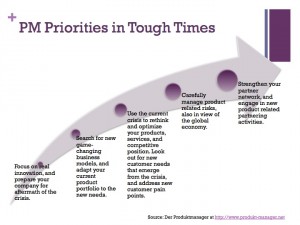The current economic crisis still worsens, and we read in the newspaper that the German economy will probably shrink for 6% in 2009 on average.
As this decline concentrates on few sectors of our economy, the situation in the highly affected sectors is even worse. This sharp decline imposes new requirements to both, corporate strategy, and business orientation.
Today, I want to recommend you several articles and studies, which suggest possibilities to rewrite or rethink how we do business, and how we deal with innovation in these tough times.
„Battered by contracting markets and frozen credit, many businesses today are fighting for survival. Indeed, the current global financial crisis provides a mandate for restructuring. But survival is not the end goal“ says Harvard Business School professor Lynda M. Applegate.
In her article → Building Businesses in Turbulent Times, Harvard Business School professor Lynda M. Applegate suggest us to not only think in terms of retrenchment and cost saving measures, but to understand growth as the most important focus, even in the current downturn.
In an interview, she presents the following key concepts:
“No company can hope to outrun this bear market and emerge unharmed…. But companies can take steps that will vastly improve their standing versus competitors, and they can position themselves optimally for an eventual economic rebound. Innovation can and should play a key part in that effort” – Innovation 2009/ The Boston Consulting Group
The Boston Consulting Group runs a yearly customer survey about innovation.
In these annual studies they identify the most innovative companies, and describe the innovation strategies, which these high performing businesses use. This year’s report →Innovation 2009: Making Hard Decisions in the Downturn deals with objectives, tactics, and perceived strengths and weaknesses of innovation strategies, and includes interesting information about innovation in general.
This year they conclude with thoughts on innovation strategies, which companies can employ in the economic downturn to improve their long-term competitive position.
To deal with the current crisis, BCG suggests the following aggressive innovation strategies:
They conclude with the following statement, which provides us with their view on importances:
“In our experience, while the vast majority of companies batten down the hatches in times of crisis, leading companies take a more sophisticated and proactive approach” – Innovation 2009/ The Boston Consulting Group
My colleagues from Pragmatic Marketing have recently published their new -> Tuned In book. In their → blog, they suggest product management to elaborate simple and enlightening action plans around the following six missions:
- Discover reality—How well are we aligned to the current market?
- Find the bright lights—What’s working and why?
- Pursue relevance—How do we make good decisions about where to invest?
- Narrow the focus—How do we build a competitive edge?
- Simplify execution—How we can make it easier to do business with us?
- Rally stakeholders—How can we build a strong network of supporters?
Product Management is not in all those areas in the driver seat that deal with the corporate repositioning in the current crisis.
 However, there are several areas were Product Management can contribute to the top-line. The following figure summarizes my own PM priorities for the current tough times. Remember, a proper Product Management function helps you in several of these focus points by means of knowledge and customer focus.
However, there are several areas were Product Management can contribute to the top-line. The following figure summarizes my own PM priorities for the current tough times. Remember, a proper Product Management function helps you in several of these focus points by means of knowledge and customer focus.
Das Original dieses Artikels ist auf →Der Produktmanager erschienen (©Andreas Rudolph). Regelmäßige Artikel gibt es über die (→Mailingliste), oder indem Sie →mir auf Twitter folgen. In der Online Version finden Sie hier die versprochenen weiterführenden Links: